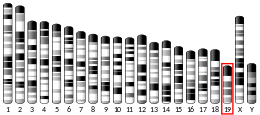ZFYVE27
Zinc finger, FYVE domain containing 27 is a protein that in humans is encoded by the ZFYVE27 gene.[5]
Function
This gene encodes a protein with several Transmembrane domains, a Rab11-binding domain and a lipid-binding FYVE finger domain. The encoded protein appears to promote Neuriteformation. A mutation in this gene has been reported to be associated with Hereditary spastic paraplegia, however the Pathogenicity of the mutation, which may simply represent a Polymorphism (biology), is unclear. [provided by RefSeq, Mar 2010].
References
Further reading
- Zhang C, Li D, Ma Y, Yan J, Yang B, Li P, Yu A, Lu C, Ma X (July 2012). "Role of spastin and protrudin in neurite outgrowth". Journal of Cellular Biochemistry. 113 (7): 2296–307. PMID 22573551. doi:10.1002/jcb.24100.
- Saita S, Shirane M, Natume T, Iemura S, Nakayama KI (May 2009). "Promotion of neurite extension by protrudin requires its interaction with vesicle-associated membrane protein-associated protein". The Journal of Biological Chemistry. 284 (20): 13766–77. PMC 2679478
 . PMID 19289470. doi:10.1074/jbc.M807938200.
. PMID 19289470. doi:10.1074/jbc.M807938200. - Mannan AU, Krawen P, Sauter SM, Boehm J, Chronowska A, Paulus W, Neesen J, Engel W (August 2006). "ZFYVE27 (SPG33), a novel spastin-binding protein, is mutated in hereditary spastic paraplegia". American Journal of Human Genetics. 79 (2): 351–7. PMC 1559503
 . PMID 16826525. doi:10.1086/504927.
. PMID 16826525. doi:10.1086/504927. - Martignoni M, Riano E, Rugarli EI (July 2008). "The role of ZFYVE27/protrudin in hereditary spastic paraplegia". American Journal of Human Genetics. 83 (1): 127–8; author reply 128–30. PMC 2443834
 . PMID 18606302. doi:10.1016/j.ajhg.2008.05.014.
. PMID 18606302. doi:10.1016/j.ajhg.2008.05.014. - Matsuzaki F, Shirane M, Matsumoto M, Nakayama KI (December 2011). "Protrudin serves as an adaptor molecule that connects KIF5 and its cargoes in vesicular transport during process formation". Molecular Biology of the Cell. 22 (23): 4602–20. PMC 3226478
 . PMID 21976701. doi:10.1091/mbc.E11-01-0068.
. PMID 21976701. doi:10.1091/mbc.E11-01-0068. - Shirane M, Nakayama KI (November 2006). "Protrudin induces neurite formation by directional membrane trafficking". Science. 314 (5800): 818–21. PMID 17082457. doi:10.1126/science.1134027.
This article incorporates text from the United States National Library of Medicine, which is in the public domain.
This article is issued from
Wikipedia.
The text is licensed under Creative Commons - Attribution - Sharealike.
Additional terms may apply for the media files.



